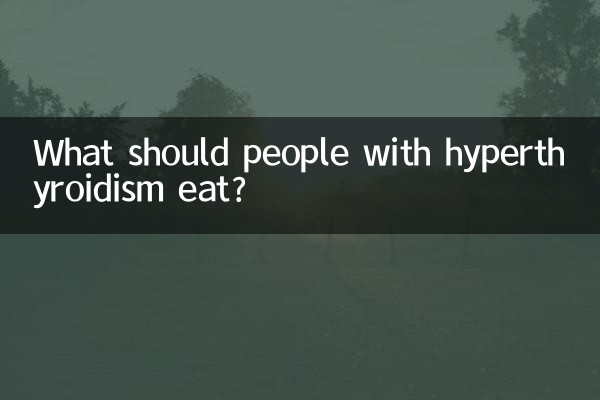What should people with hyperthyroidism eat: scientific dietary guidelines and analysis of hot topics
In recent years, the incidence of hyperthyroidism (hyperthyroidism) has gradually increased and has become one of the health hotspots of public concern. Especially in the past 10 days, the discussion on the dietary management of hyperthyroidism has been very popular across the Internet. This article will combine the latest hot topics and authoritative medical advice to provide a scientific and practical dietary guide for patients with hyperthyroidism.
1. Diet principles for hyperthyroidism

Patients with hyperthyroidism are prone to malnutrition, weight loss and other problems due to their elevated metabolic rate. Therefore, the diet needs to follow the following principles: high calories, high protein, high vitamins, appropriate amounts of minerals (especially calcium and phosphorus), and avoid irritating foods.
| Nutrients | Recommended food | Recommended daily intake |
|---|---|---|
| heat | Whole grains, nuts, healthy oils | 20%-30% more than normal people |
| protein | Eggs, lean meat, fish, soy products | 1.5-2g/kg body weight |
| vitamins | Fresh fruits and vegetables (especially B vitamins) | Diverse intake |
| Minerals | Dairy products, dark green vegetables (calcium supplement) | Calcium 1000-1200mg/day |
2. Recent hot food topics
1.Is a gluten-free diet suitable for people with hyperthyroidism?Recent studies have pointed out that some patients with hyperthyroidism may be allergic to gluten, but not all patients need a gluten-free diet, and it is recommended to adjust according to individual circumstances.
2.Do cruciferous vegetables really make hyperthyroidism worse?The "broccoli controversy" hotly discussed on the Internet: In fact, daily consumption of cruciferous vegetables will not significantly affect thyroid function, but excessive raw food may interfere with iodine absorption.
3.The influence of Internet celebrity "super food" on hyperthyroidismFoods rich in omega-3, such as chia seeds and flax seeds, are indeed beneficial, but some seaweed "superfoods" containing high iodine should be used with caution.
3. Specific recommended food list
| food category | Recommended food | Things to note |
|---|---|---|
| Staple food | Brown rice, oats, whole wheat bread | Provide sufficient carbohydrates |
| protein | Chicken breast, salmon, tofu | High quality protein source |
| Vegetables | Spinach, carrots, pumpkin | Rich in vitamins and minerals |
| Fruits | Banana, blueberry, apple | Supplement potassium and antioxidants |
| dairy products | Low-fat milk, yogurt | Calcium supplement preferred |
4. Foods that need to be limited or avoided
1.Foods high in iodine:Seaweed, seaweed and other seafood (unless your doctor recommends iodine supplementation)
2.Pungent foods:Coffee, strong tea, alcohol, spicy condiments
3.Goitrogenic foods:Eat lots of raw cabbage, cassava, etc. (cooking can reduce the impact)
4.High-sugar foods:Desserts and sugary drinks (easily aggravate metabolic disorders)
5. Recent popular questions and answers on the Internet
Q: Can patients with hyperthyroidism eat soy products?
A: You can consume it in moderation, but it is best to take it at least 4 hours apart from thyroid medicine to avoid affecting the absorption of the medicine.
Q: Does drinking green tea help hyperthyroidism?
A: The catechins in green tea may have a slight anti-thyroid effect, but the caffeine content is high, so it is recommended to drink it in a limited amount.
Q: Is the ketogenic diet suitable for patients with hyperthyroidism?
A: Recent studies have shown that the ketogenic diet may aggravate the symptoms of hyperthyroidism, and it is not recommended to try it on your own.
6. Suggestions for matching meals
| Meals | Recommended combination | Nutritional characteristics |
|---|---|---|
| breakfast | Oatmeal + boiled eggs + banana + walnuts | High protein, high energy |
| Lunch | Brown rice + steamed fish + fried spinach + pumpkin soup | Balanced nutrition |
| dinner | Whole wheat noodles + chicken breast + broccoli + yogurt | Easy to digest |
| Extra meal | Fruit/nuts/low-fat milk | replenish energy |
7. Summary
The dietary management of patients with hyperthyroidism requires individualized adjustments, and it is recommended to develop a dietary plan under the guidance of a doctor and a nutritionist. Various dietary methods that have been hotly discussed on the Internet recently require a rational view of scientific evidence and avoid blindly following trends. Remember, good eating habits combined with standard treatment can effectively control the symptoms of hyperthyroidism.
Note: The dietary recommendations in this article are based on general conditions. Please follow your doctor’s advice for specific implementation. The hot topic data in the past 10 days comes from the analysis of discussion popularity on major health platforms.

check the details

check the details